Kantian Ethics: Applying Categorical Imperatives to Real Situations
VerifiedAdded on 2023/06/11
|10
|2421
|309
Discussion Board Post
AI Summary
This assignment delves into Kantian ethics, focusing on the application of categorical imperatives to real-world situations, such as women marrying for wealth and the stolen generation in Australia. It contrasts Kant's deontological approach with natural law theories, examining human nature's inherent characteristics like greed and jealousy and their impact on morality. Furthermore, it explores Aristotle's concept of virtue as a balance between excess and deficiency, using examples like indignation and overspending to illustrate how vices can be transformed into virtues through rational behavior and moral responsibility. The discussion includes insights into achieving a stable equilibrium of the soul by choosing virtuous actions and realizing the implications of one's behavior, all available for students on Desklib.
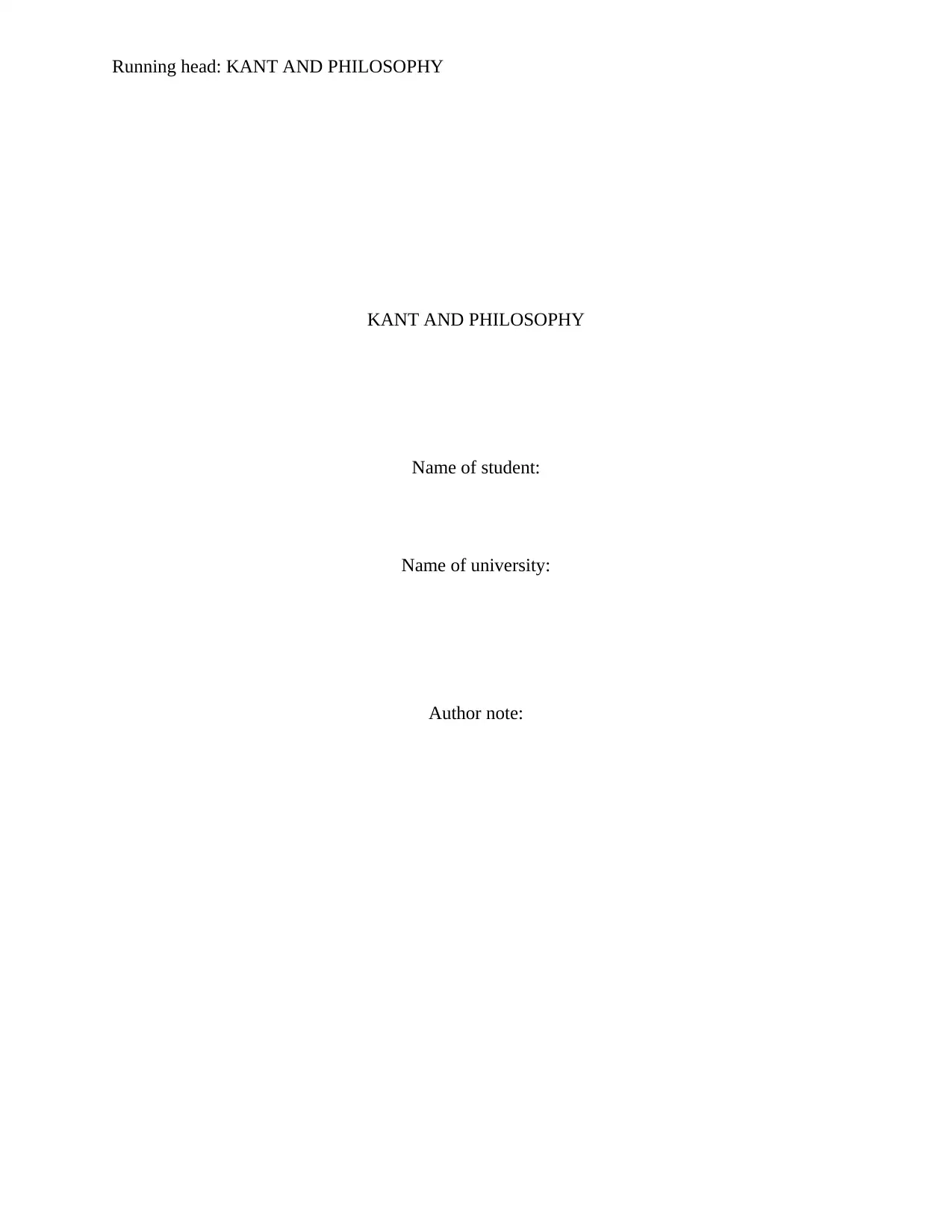
Running head: KANT AND PHILOSOPHY
KANT AND PHILOSOPHY
Name of student:
Name of university:
Author note:
KANT AND PHILOSOPHY
Name of student:
Name of university:
Author note:
Paraphrase This Document
Need a fresh take? Get an instant paraphrase of this document with our AI Paraphraser
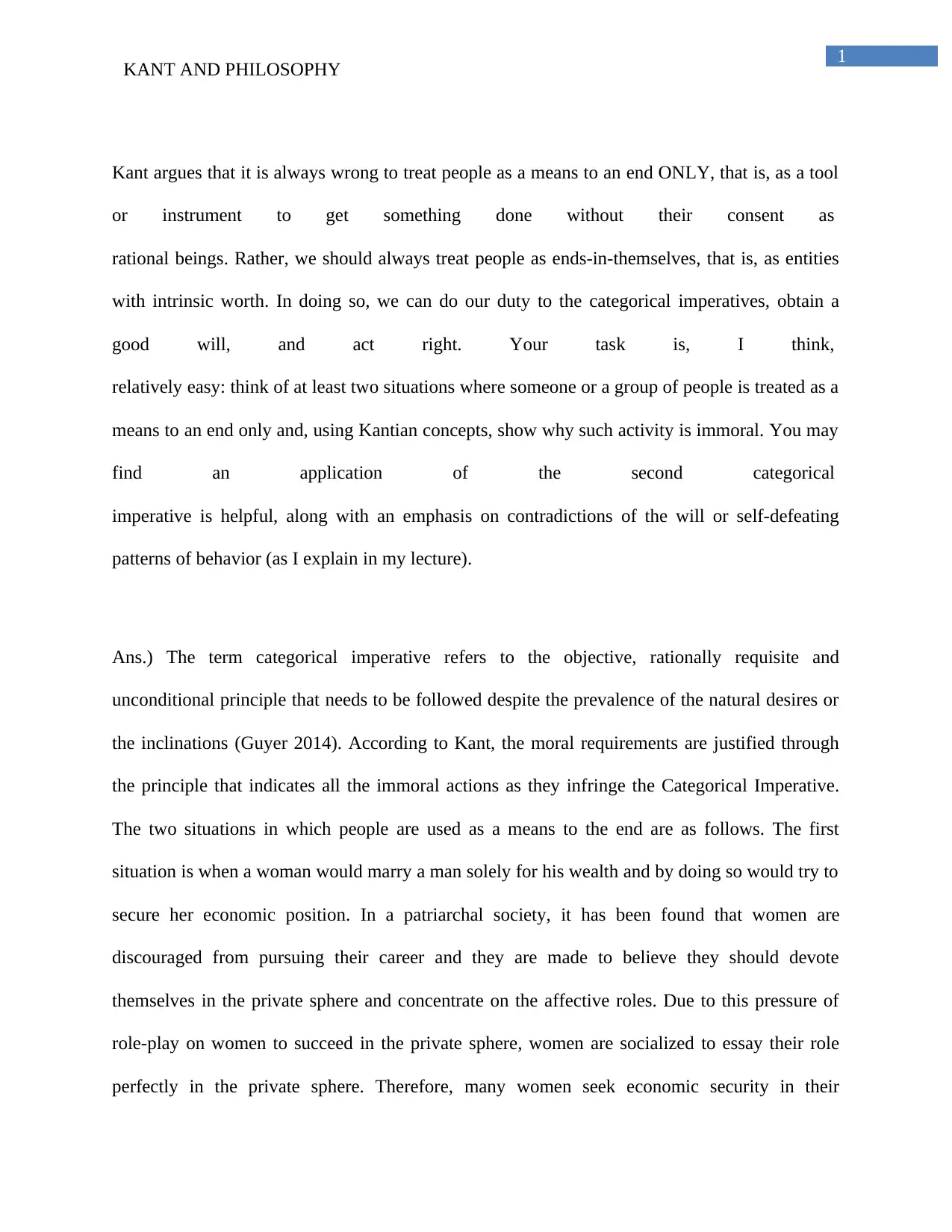
1
KANT AND PHILOSOPHY
Kant argues that it is always wrong to treat people as a means to an end ONLY, that is, as a tool
or instrument to get something done without their consent as
rational beings. Rather, we should always treat people as ends-in-themselves, that is, as entities
with intrinsic worth. In doing so, we can do our duty to the categorical imperatives, obtain a
good will, and act right. Your task is, I think,
relatively easy: think of at least two situations where someone or a group of people is treated as a
means to an end only and, using Kantian concepts, show why such activity is immoral. You may
find an application of the second categorical
imperative is helpful, along with an emphasis on contradictions of the will or self-defeating
patterns of behavior (as I explain in my lecture).
Ans.) The term categorical imperative refers to the objective, rationally requisite and
unconditional principle that needs to be followed despite the prevalence of the natural desires or
the inclinations (Guyer 2014). According to Kant, the moral requirements are justified through
the principle that indicates all the immoral actions as they infringe the Categorical Imperative.
The two situations in which people are used as a means to the end are as follows. The first
situation is when a woman would marry a man solely for his wealth and by doing so would try to
secure her economic position. In a patriarchal society, it has been found that women are
discouraged from pursuing their career and they are made to believe they should devote
themselves in the private sphere and concentrate on the affective roles. Due to this pressure of
role-play on women to succeed in the private sphere, women are socialized to essay their role
perfectly in the private sphere. Therefore, many women seek economic security in their
KANT AND PHILOSOPHY
Kant argues that it is always wrong to treat people as a means to an end ONLY, that is, as a tool
or instrument to get something done without their consent as
rational beings. Rather, we should always treat people as ends-in-themselves, that is, as entities
with intrinsic worth. In doing so, we can do our duty to the categorical imperatives, obtain a
good will, and act right. Your task is, I think,
relatively easy: think of at least two situations where someone or a group of people is treated as a
means to an end only and, using Kantian concepts, show why such activity is immoral. You may
find an application of the second categorical
imperative is helpful, along with an emphasis on contradictions of the will or self-defeating
patterns of behavior (as I explain in my lecture).
Ans.) The term categorical imperative refers to the objective, rationally requisite and
unconditional principle that needs to be followed despite the prevalence of the natural desires or
the inclinations (Guyer 2014). According to Kant, the moral requirements are justified through
the principle that indicates all the immoral actions as they infringe the Categorical Imperative.
The two situations in which people are used as a means to the end are as follows. The first
situation is when a woman would marry a man solely for his wealth and by doing so would try to
secure her economic position. In a patriarchal society, it has been found that women are
discouraged from pursuing their career and they are made to believe they should devote
themselves in the private sphere and concentrate on the affective roles. Due to this pressure of
role-play on women to succeed in the private sphere, women are socialized to essay their role
perfectly in the private sphere. Therefore, many women seek economic security in their
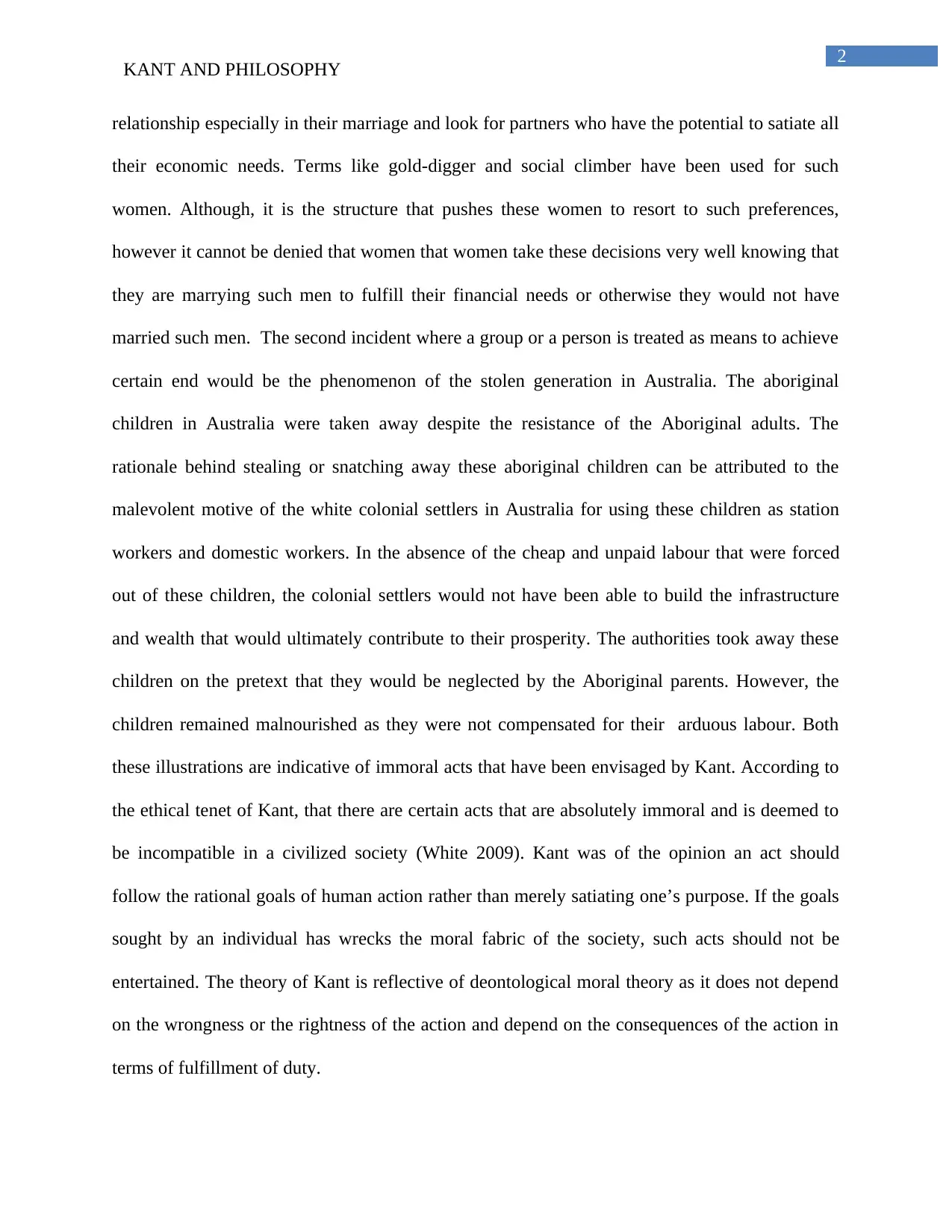
2
KANT AND PHILOSOPHY
relationship especially in their marriage and look for partners who have the potential to satiate all
their economic needs. Terms like gold-digger and social climber have been used for such
women. Although, it is the structure that pushes these women to resort to such preferences,
however it cannot be denied that women that women take these decisions very well knowing that
they are marrying such men to fulfill their financial needs or otherwise they would not have
married such men. The second incident where a group or a person is treated as means to achieve
certain end would be the phenomenon of the stolen generation in Australia. The aboriginal
children in Australia were taken away despite the resistance of the Aboriginal adults. The
rationale behind stealing or snatching away these aboriginal children can be attributed to the
malevolent motive of the white colonial settlers in Australia for using these children as station
workers and domestic workers. In the absence of the cheap and unpaid labour that were forced
out of these children, the colonial settlers would not have been able to build the infrastructure
and wealth that would ultimately contribute to their prosperity. The authorities took away these
children on the pretext that they would be neglected by the Aboriginal parents. However, the
children remained malnourished as they were not compensated for their arduous labour. Both
these illustrations are indicative of immoral acts that have been envisaged by Kant. According to
the ethical tenet of Kant, that there are certain acts that are absolutely immoral and is deemed to
be incompatible in a civilized society (White 2009). Kant was of the opinion an act should
follow the rational goals of human action rather than merely satiating one’s purpose. If the goals
sought by an individual has wrecks the moral fabric of the society, such acts should not be
entertained. The theory of Kant is reflective of deontological moral theory as it does not depend
on the wrongness or the rightness of the action and depend on the consequences of the action in
terms of fulfillment of duty.
KANT AND PHILOSOPHY
relationship especially in their marriage and look for partners who have the potential to satiate all
their economic needs. Terms like gold-digger and social climber have been used for such
women. Although, it is the structure that pushes these women to resort to such preferences,
however it cannot be denied that women that women take these decisions very well knowing that
they are marrying such men to fulfill their financial needs or otherwise they would not have
married such men. The second incident where a group or a person is treated as means to achieve
certain end would be the phenomenon of the stolen generation in Australia. The aboriginal
children in Australia were taken away despite the resistance of the Aboriginal adults. The
rationale behind stealing or snatching away these aboriginal children can be attributed to the
malevolent motive of the white colonial settlers in Australia for using these children as station
workers and domestic workers. In the absence of the cheap and unpaid labour that were forced
out of these children, the colonial settlers would not have been able to build the infrastructure
and wealth that would ultimately contribute to their prosperity. The authorities took away these
children on the pretext that they would be neglected by the Aboriginal parents. However, the
children remained malnourished as they were not compensated for their arduous labour. Both
these illustrations are indicative of immoral acts that have been envisaged by Kant. According to
the ethical tenet of Kant, that there are certain acts that are absolutely immoral and is deemed to
be incompatible in a civilized society (White 2009). Kant was of the opinion an act should
follow the rational goals of human action rather than merely satiating one’s purpose. If the goals
sought by an individual has wrecks the moral fabric of the society, such acts should not be
entertained. The theory of Kant is reflective of deontological moral theory as it does not depend
on the wrongness or the rightness of the action and depend on the consequences of the action in
terms of fulfillment of duty.
⊘ This is a preview!⊘
Do you want full access?
Subscribe today to unlock all pages.

Trusted by 1+ million students worldwide
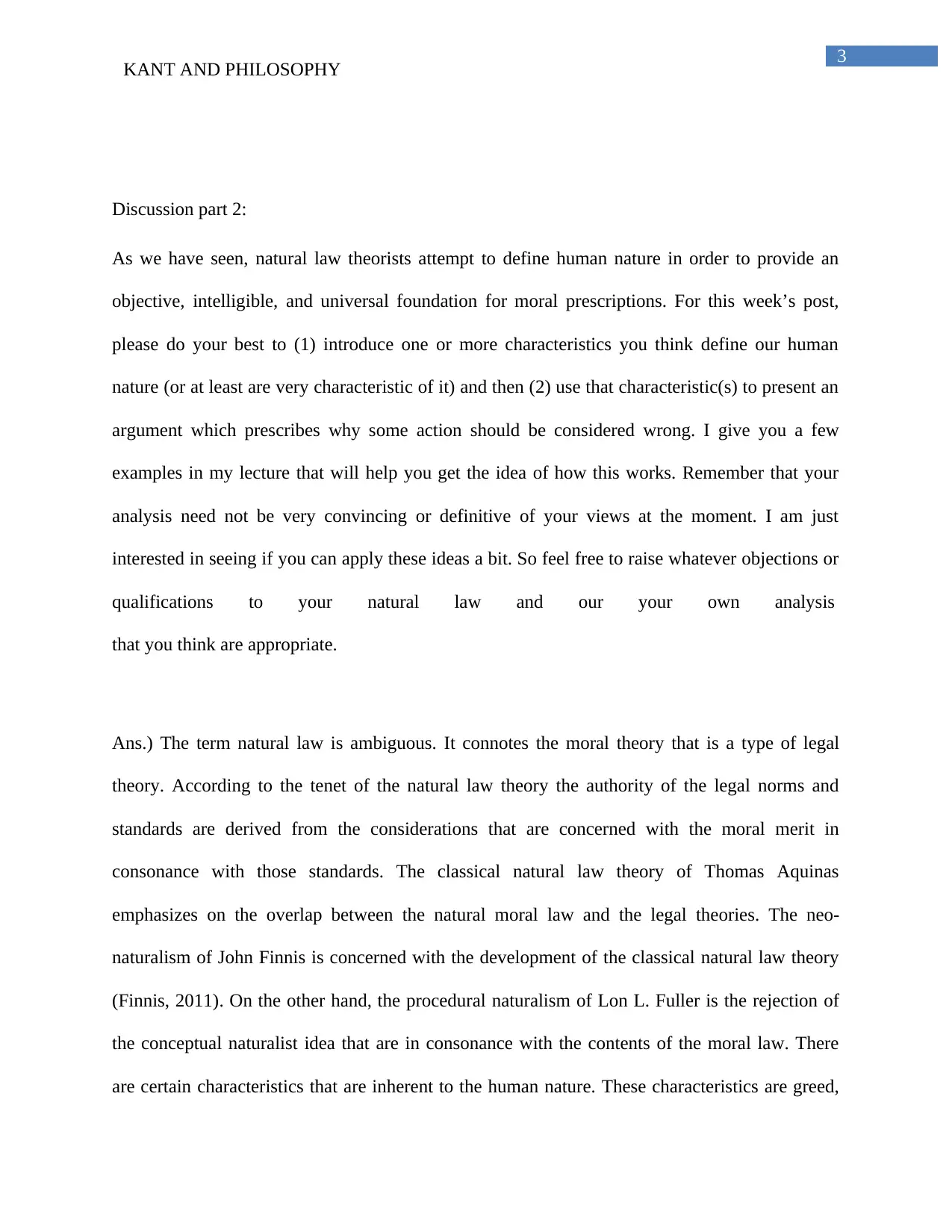
3
KANT AND PHILOSOPHY
Discussion part 2:
As we have seen, natural law theorists attempt to define human nature in order to provide an
objective, intelligible, and universal foundation for moral prescriptions. For this week’s post,
please do your best to (1) introduce one or more characteristics you think define our human
nature (or at least are very characteristic of it) and then (2) use that characteristic(s) to present an
argument which prescribes why some action should be considered wrong. I give you a few
examples in my lecture that will help you get the idea of how this works. Remember that your
analysis need not be very convincing or definitive of your views at the moment. I am just
interested in seeing if you can apply these ideas a bit. So feel free to raise whatever objections or
qualifications to your natural law and our your own analysis
that you think are appropriate.
Ans.) The term natural law is ambiguous. It connotes the moral theory that is a type of legal
theory. According to the tenet of the natural law theory the authority of the legal norms and
standards are derived from the considerations that are concerned with the moral merit in
consonance with those standards. The classical natural law theory of Thomas Aquinas
emphasizes on the overlap between the natural moral law and the legal theories. The neo-
naturalism of John Finnis is concerned with the development of the classical natural law theory
(Finnis, 2011). On the other hand, the procedural naturalism of Lon L. Fuller is the rejection of
the conceptual naturalist idea that are in consonance with the contents of the moral law. There
are certain characteristics that are inherent to the human nature. These characteristics are greed,
KANT AND PHILOSOPHY
Discussion part 2:
As we have seen, natural law theorists attempt to define human nature in order to provide an
objective, intelligible, and universal foundation for moral prescriptions. For this week’s post,
please do your best to (1) introduce one or more characteristics you think define our human
nature (or at least are very characteristic of it) and then (2) use that characteristic(s) to present an
argument which prescribes why some action should be considered wrong. I give you a few
examples in my lecture that will help you get the idea of how this works. Remember that your
analysis need not be very convincing or definitive of your views at the moment. I am just
interested in seeing if you can apply these ideas a bit. So feel free to raise whatever objections or
qualifications to your natural law and our your own analysis
that you think are appropriate.
Ans.) The term natural law is ambiguous. It connotes the moral theory that is a type of legal
theory. According to the tenet of the natural law theory the authority of the legal norms and
standards are derived from the considerations that are concerned with the moral merit in
consonance with those standards. The classical natural law theory of Thomas Aquinas
emphasizes on the overlap between the natural moral law and the legal theories. The neo-
naturalism of John Finnis is concerned with the development of the classical natural law theory
(Finnis, 2011). On the other hand, the procedural naturalism of Lon L. Fuller is the rejection of
the conceptual naturalist idea that are in consonance with the contents of the moral law. There
are certain characteristics that are inherent to the human nature. These characteristics are greed,
Paraphrase This Document
Need a fresh take? Get an instant paraphrase of this document with our AI Paraphraser
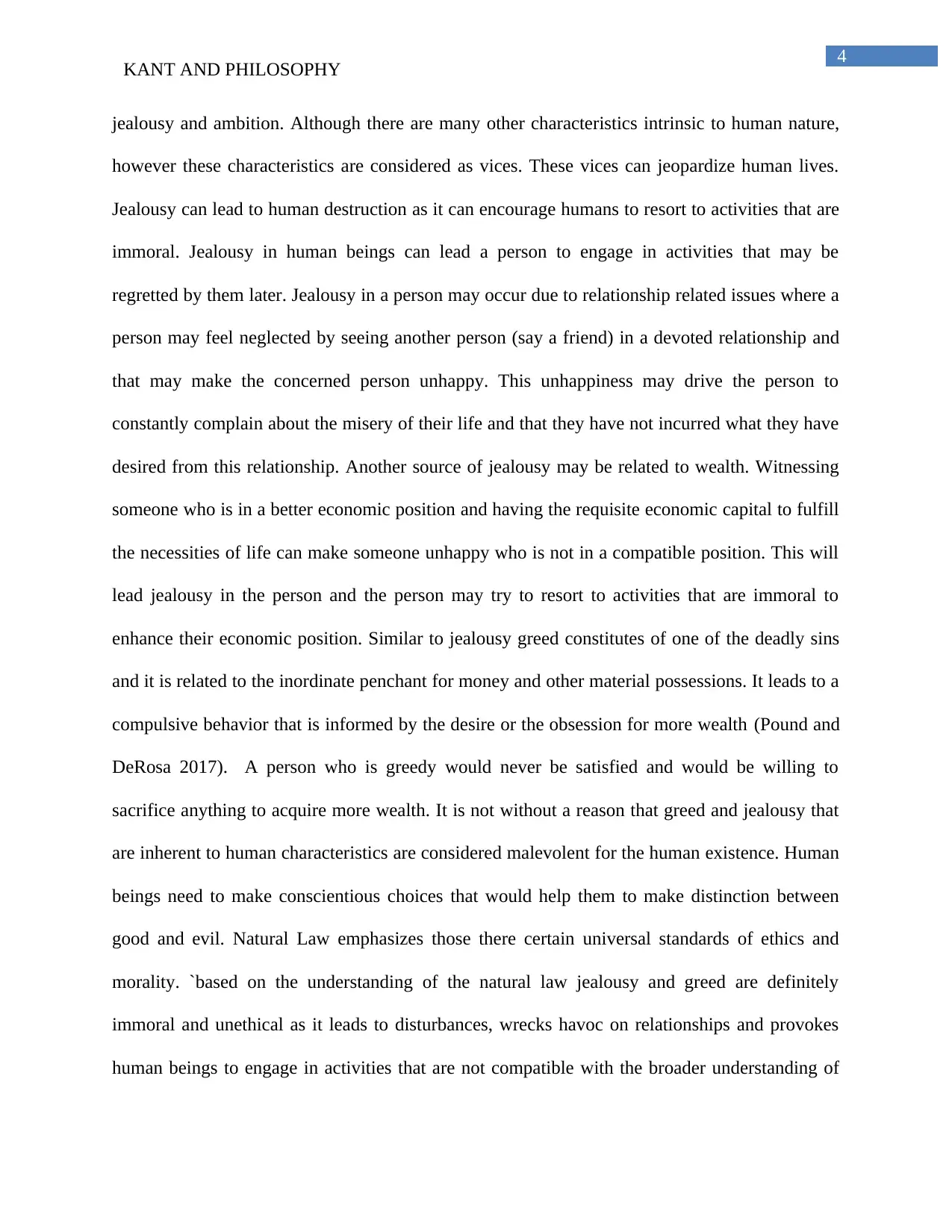
4
KANT AND PHILOSOPHY
jealousy and ambition. Although there are many other characteristics intrinsic to human nature,
however these characteristics are considered as vices. These vices can jeopardize human lives.
Jealousy can lead to human destruction as it can encourage humans to resort to activities that are
immoral. Jealousy in human beings can lead a person to engage in activities that may be
regretted by them later. Jealousy in a person may occur due to relationship related issues where a
person may feel neglected by seeing another person (say a friend) in a devoted relationship and
that may make the concerned person unhappy. This unhappiness may drive the person to
constantly complain about the misery of their life and that they have not incurred what they have
desired from this relationship. Another source of jealousy may be related to wealth. Witnessing
someone who is in a better economic position and having the requisite economic capital to fulfill
the necessities of life can make someone unhappy who is not in a compatible position. This will
lead jealousy in the person and the person may try to resort to activities that are immoral to
enhance their economic position. Similar to jealousy greed constitutes of one of the deadly sins
and it is related to the inordinate penchant for money and other material possessions. It leads to a
compulsive behavior that is informed by the desire or the obsession for more wealth (Pound and
DeRosa 2017). A person who is greedy would never be satisfied and would be willing to
sacrifice anything to acquire more wealth. It is not without a reason that greed and jealousy that
are inherent to human characteristics are considered malevolent for the human existence. Human
beings need to make conscientious choices that would help them to make distinction between
good and evil. Natural Law emphasizes those there certain universal standards of ethics and
morality. `based on the understanding of the natural law jealousy and greed are definitely
immoral and unethical as it leads to disturbances, wrecks havoc on relationships and provokes
human beings to engage in activities that are not compatible with the broader understanding of
KANT AND PHILOSOPHY
jealousy and ambition. Although there are many other characteristics intrinsic to human nature,
however these characteristics are considered as vices. These vices can jeopardize human lives.
Jealousy can lead to human destruction as it can encourage humans to resort to activities that are
immoral. Jealousy in human beings can lead a person to engage in activities that may be
regretted by them later. Jealousy in a person may occur due to relationship related issues where a
person may feel neglected by seeing another person (say a friend) in a devoted relationship and
that may make the concerned person unhappy. This unhappiness may drive the person to
constantly complain about the misery of their life and that they have not incurred what they have
desired from this relationship. Another source of jealousy may be related to wealth. Witnessing
someone who is in a better economic position and having the requisite economic capital to fulfill
the necessities of life can make someone unhappy who is not in a compatible position. This will
lead jealousy in the person and the person may try to resort to activities that are immoral to
enhance their economic position. Similar to jealousy greed constitutes of one of the deadly sins
and it is related to the inordinate penchant for money and other material possessions. It leads to a
compulsive behavior that is informed by the desire or the obsession for more wealth (Pound and
DeRosa 2017). A person who is greedy would never be satisfied and would be willing to
sacrifice anything to acquire more wealth. It is not without a reason that greed and jealousy that
are inherent to human characteristics are considered malevolent for the human existence. Human
beings need to make conscientious choices that would help them to make distinction between
good and evil. Natural Law emphasizes those there certain universal standards of ethics and
morality. `based on the understanding of the natural law jealousy and greed are definitely
immoral and unethical as it leads to disturbances, wrecks havoc on relationships and provokes
human beings to engage in activities that are not compatible with the broader understanding of
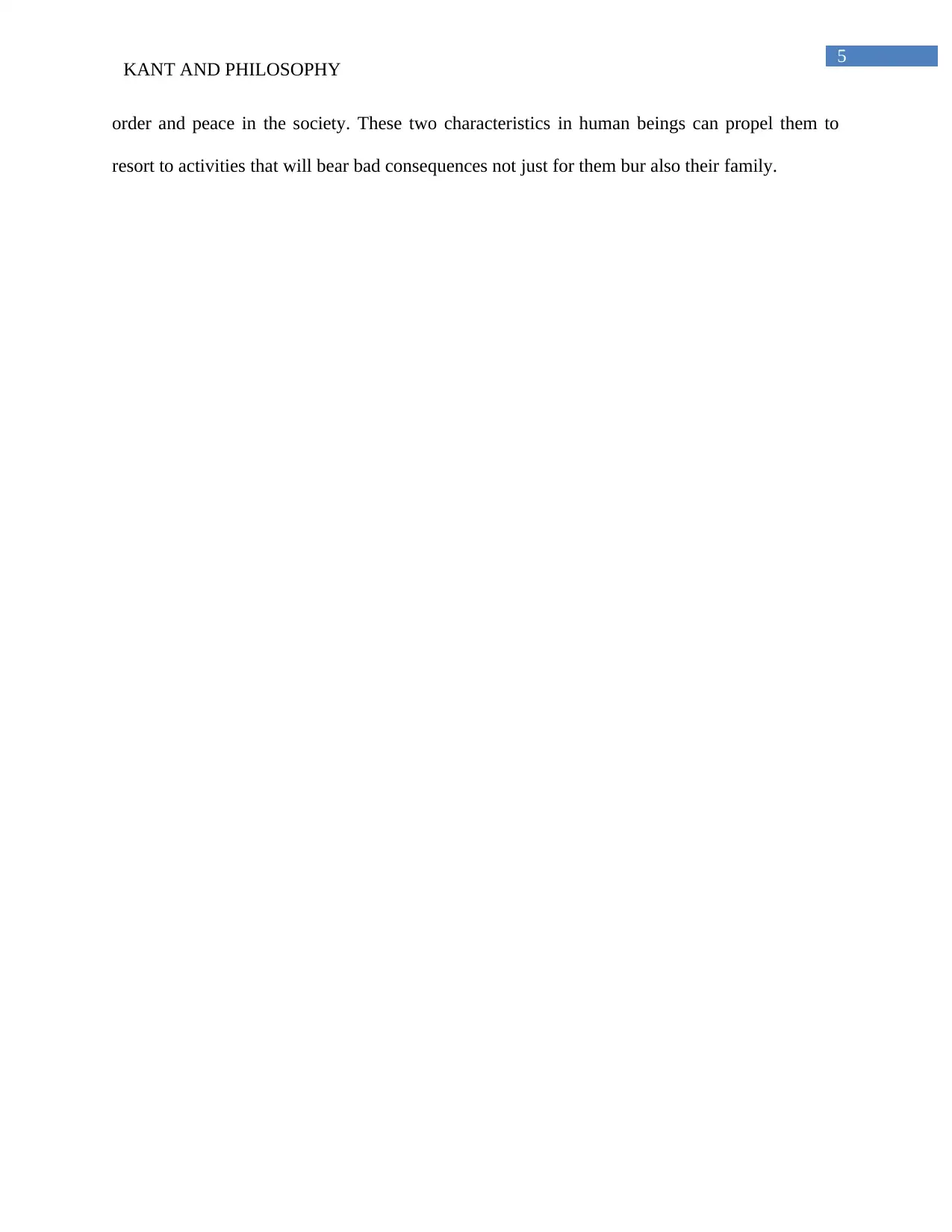
5
KANT AND PHILOSOPHY
order and peace in the society. These two characteristics in human beings can propel them to
resort to activities that will bear bad consequences not just for them bur also their family.
KANT AND PHILOSOPHY
order and peace in the society. These two characteristics in human beings can propel them to
resort to activities that will bear bad consequences not just for them bur also their family.
⊘ This is a preview!⊘
Do you want full access?
Subscribe today to unlock all pages.

Trusted by 1+ million students worldwide
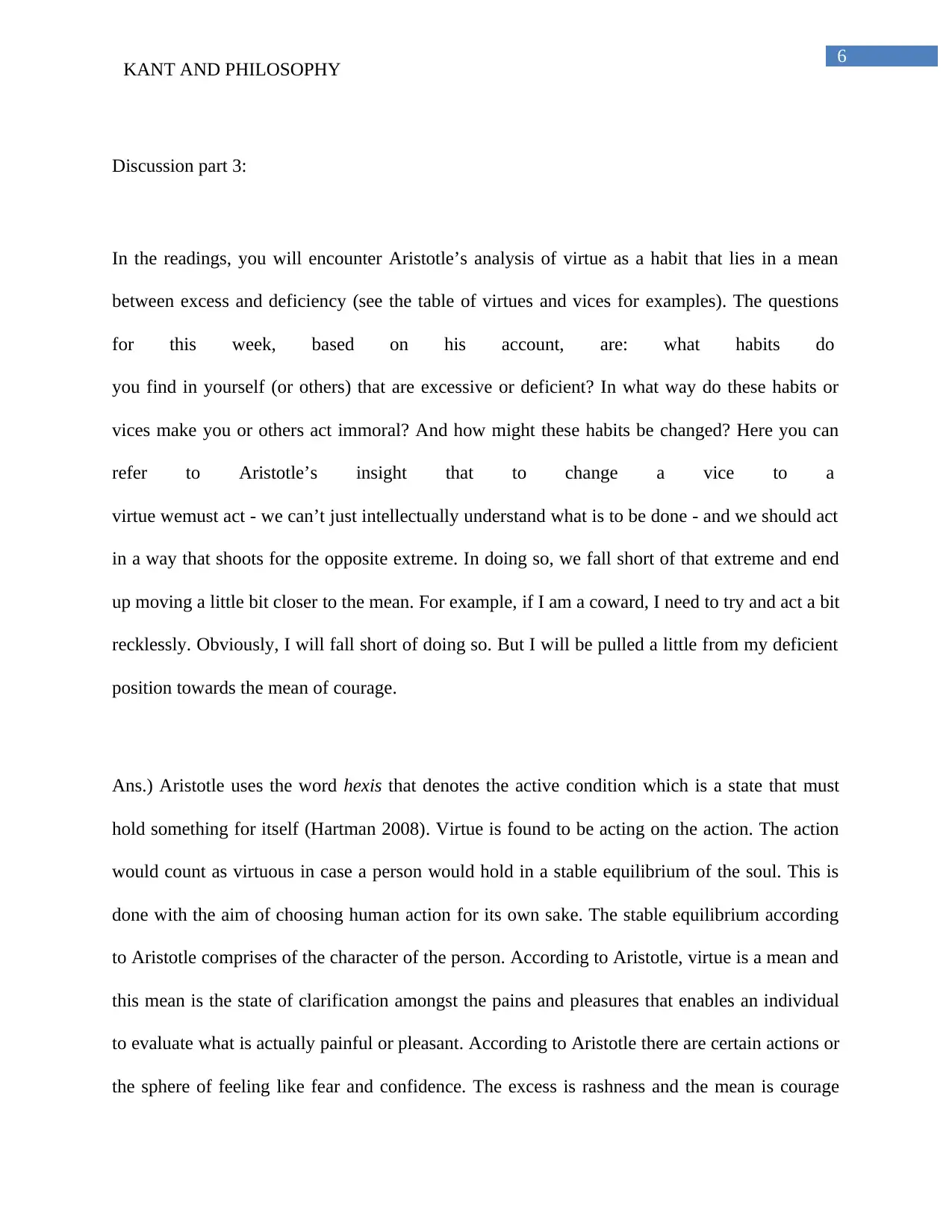
6
KANT AND PHILOSOPHY
Discussion part 3:
In the readings, you will encounter Aristotle’s analysis of virtue as a habit that lies in a mean
between excess and deficiency (see the table of virtues and vices for examples). The questions
for this week, based on his account, are: what habits do
you find in yourself (or others) that are excessive or deficient? In what way do these habits or
vices make you or others act immoral? And how might these habits be changed? Here you can
refer to Aristotle’s insight that to change a vice to a
virtue wemust act - we can’t just intellectually understand what is to be done - and we should act
in a way that shoots for the opposite extreme. In doing so, we fall short of that extreme and end
up moving a little bit closer to the mean. For example, if I am a coward, I need to try and act a bit
recklessly. Obviously, I will fall short of doing so. But I will be pulled a little from my deficient
position towards the mean of courage.
Ans.) Aristotle uses the word hexis that denotes the active condition which is a state that must
hold something for itself (Hartman 2008). Virtue is found to be acting on the action. The action
would count as virtuous in case a person would hold in a stable equilibrium of the soul. This is
done with the aim of choosing human action for its own sake. The stable equilibrium according
to Aristotle comprises of the character of the person. According to Aristotle, virtue is a mean and
this mean is the state of clarification amongst the pains and pleasures that enables an individual
to evaluate what is actually painful or pleasant. According to Aristotle there are certain actions or
the sphere of feeling like fear and confidence. The excess is rashness and the mean is courage
KANT AND PHILOSOPHY
Discussion part 3:
In the readings, you will encounter Aristotle’s analysis of virtue as a habit that lies in a mean
between excess and deficiency (see the table of virtues and vices for examples). The questions
for this week, based on his account, are: what habits do
you find in yourself (or others) that are excessive or deficient? In what way do these habits or
vices make you or others act immoral? And how might these habits be changed? Here you can
refer to Aristotle’s insight that to change a vice to a
virtue wemust act - we can’t just intellectually understand what is to be done - and we should act
in a way that shoots for the opposite extreme. In doing so, we fall short of that extreme and end
up moving a little bit closer to the mean. For example, if I am a coward, I need to try and act a bit
recklessly. Obviously, I will fall short of doing so. But I will be pulled a little from my deficient
position towards the mean of courage.
Ans.) Aristotle uses the word hexis that denotes the active condition which is a state that must
hold something for itself (Hartman 2008). Virtue is found to be acting on the action. The action
would count as virtuous in case a person would hold in a stable equilibrium of the soul. This is
done with the aim of choosing human action for its own sake. The stable equilibrium according
to Aristotle comprises of the character of the person. According to Aristotle, virtue is a mean and
this mean is the state of clarification amongst the pains and pleasures that enables an individual
to evaluate what is actually painful or pleasant. According to Aristotle there are certain actions or
the sphere of feeling like fear and confidence. The excess is rashness and the mean is courage
Paraphrase This Document
Need a fresh take? Get an instant paraphrase of this document with our AI Paraphraser
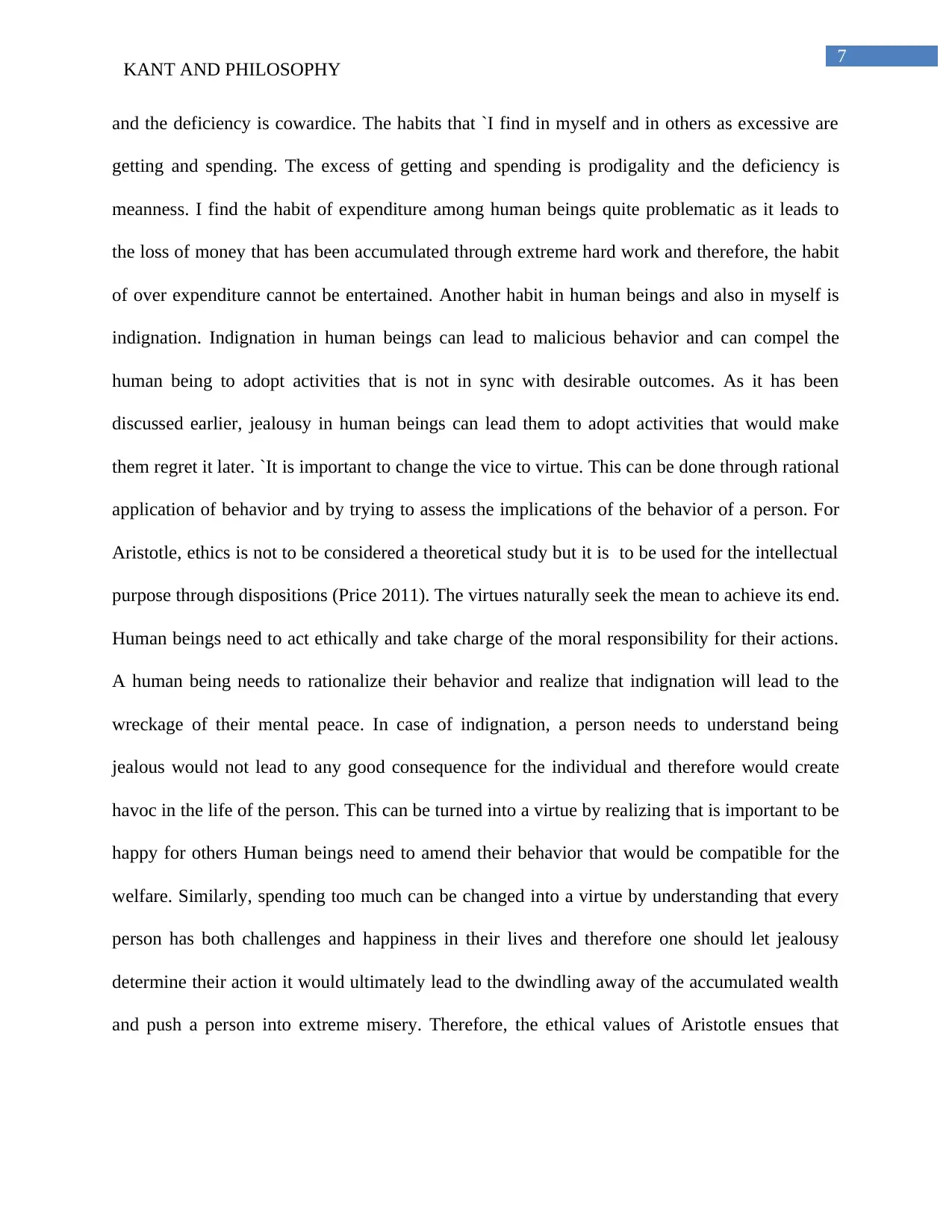
7
KANT AND PHILOSOPHY
and the deficiency is cowardice. The habits that `I find in myself and in others as excessive are
getting and spending. The excess of getting and spending is prodigality and the deficiency is
meanness. I find the habit of expenditure among human beings quite problematic as it leads to
the loss of money that has been accumulated through extreme hard work and therefore, the habit
of over expenditure cannot be entertained. Another habit in human beings and also in myself is
indignation. Indignation in human beings can lead to malicious behavior and can compel the
human being to adopt activities that is not in sync with desirable outcomes. As it has been
discussed earlier, jealousy in human beings can lead them to adopt activities that would make
them regret it later. `It is important to change the vice to virtue. This can be done through rational
application of behavior and by trying to assess the implications of the behavior of a person. For
Aristotle, ethics is not to be considered a theoretical study but it is to be used for the intellectual
purpose through dispositions (Price 2011). The virtues naturally seek the mean to achieve its end.
Human beings need to act ethically and take charge of the moral responsibility for their actions.
A human being needs to rationalize their behavior and realize that indignation will lead to the
wreckage of their mental peace. In case of indignation, a person needs to understand being
jealous would not lead to any good consequence for the individual and therefore would create
havoc in the life of the person. This can be turned into a virtue by realizing that is important to be
happy for others Human beings need to amend their behavior that would be compatible for the
welfare. Similarly, spending too much can be changed into a virtue by understanding that every
person has both challenges and happiness in their lives and therefore one should let jealousy
determine their action it would ultimately lead to the dwindling away of the accumulated wealth
and push a person into extreme misery. Therefore, the ethical values of Aristotle ensues that
KANT AND PHILOSOPHY
and the deficiency is cowardice. The habits that `I find in myself and in others as excessive are
getting and spending. The excess of getting and spending is prodigality and the deficiency is
meanness. I find the habit of expenditure among human beings quite problematic as it leads to
the loss of money that has been accumulated through extreme hard work and therefore, the habit
of over expenditure cannot be entertained. Another habit in human beings and also in myself is
indignation. Indignation in human beings can lead to malicious behavior and can compel the
human being to adopt activities that is not in sync with desirable outcomes. As it has been
discussed earlier, jealousy in human beings can lead them to adopt activities that would make
them regret it later. `It is important to change the vice to virtue. This can be done through rational
application of behavior and by trying to assess the implications of the behavior of a person. For
Aristotle, ethics is not to be considered a theoretical study but it is to be used for the intellectual
purpose through dispositions (Price 2011). The virtues naturally seek the mean to achieve its end.
Human beings need to act ethically and take charge of the moral responsibility for their actions.
A human being needs to rationalize their behavior and realize that indignation will lead to the
wreckage of their mental peace. In case of indignation, a person needs to understand being
jealous would not lead to any good consequence for the individual and therefore would create
havoc in the life of the person. This can be turned into a virtue by realizing that is important to be
happy for others Human beings need to amend their behavior that would be compatible for the
welfare. Similarly, spending too much can be changed into a virtue by understanding that every
person has both challenges and happiness in their lives and therefore one should let jealousy
determine their action it would ultimately lead to the dwindling away of the accumulated wealth
and push a person into extreme misery. Therefore, the ethical values of Aristotle ensues that
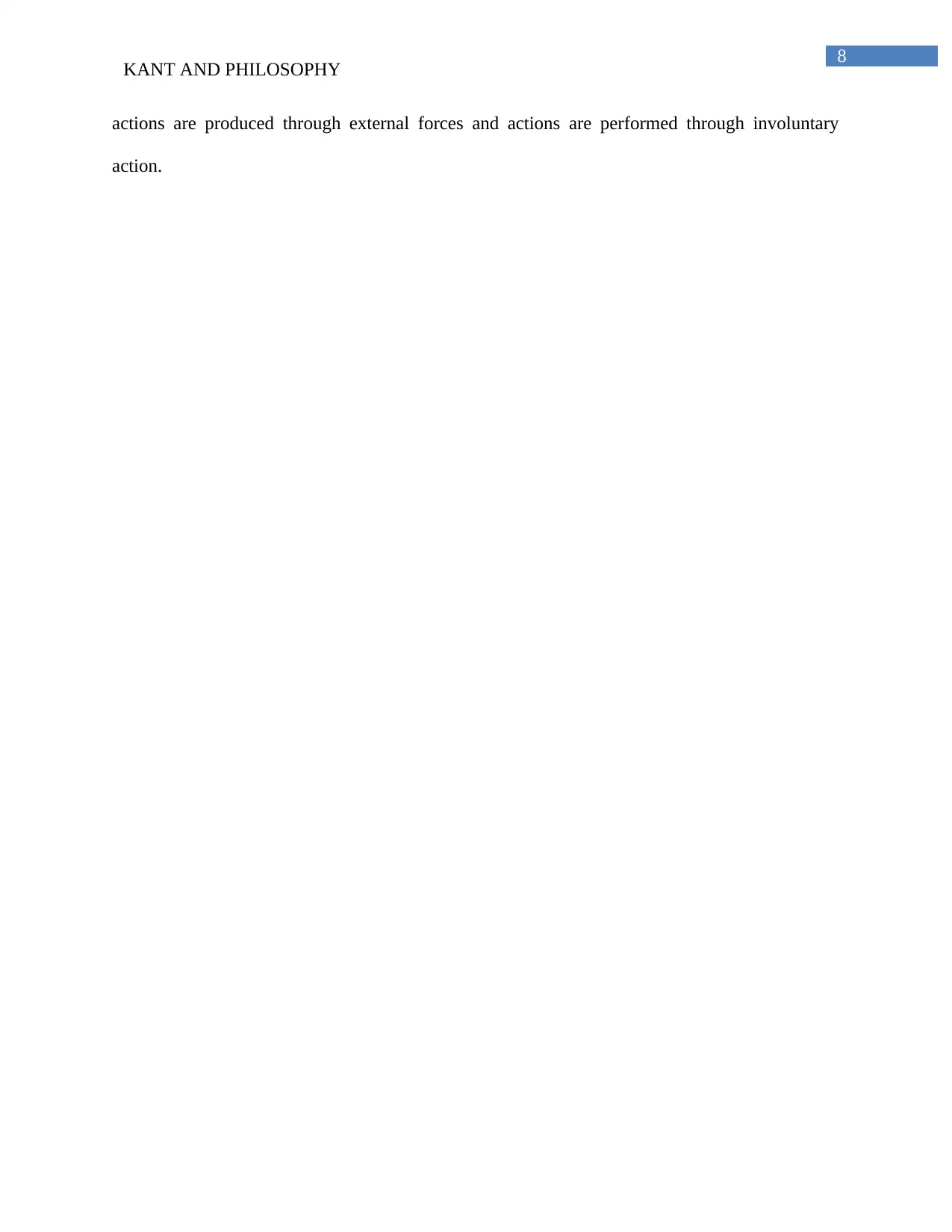
8
KANT AND PHILOSOPHY
actions are produced through external forces and actions are performed through involuntary
action.
KANT AND PHILOSOPHY
actions are produced through external forces and actions are performed through involuntary
action.
⊘ This is a preview!⊘
Do you want full access?
Subscribe today to unlock all pages.

Trusted by 1+ million students worldwide
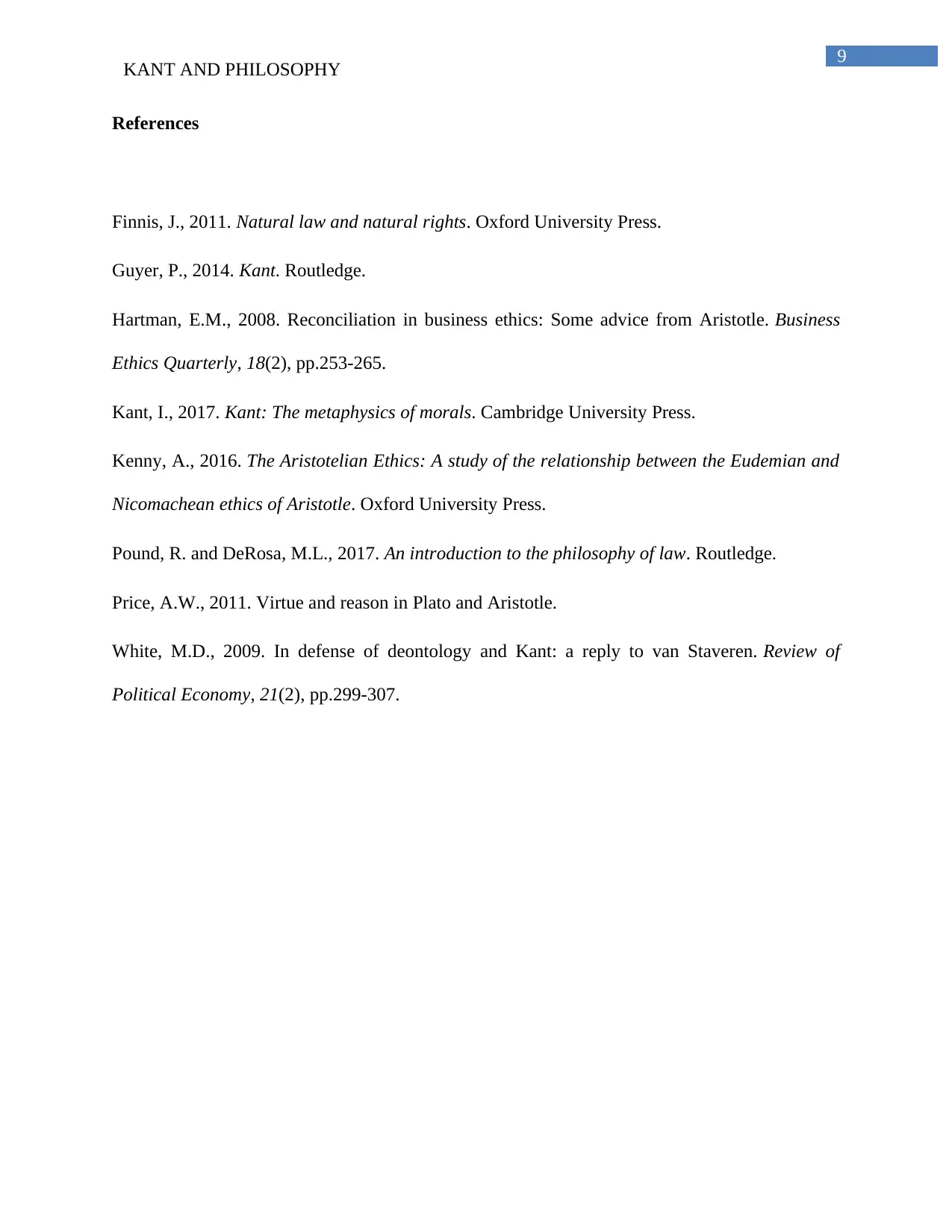
9
KANT AND PHILOSOPHY
References
Finnis, J., 2011. Natural law and natural rights. Oxford University Press.
Guyer, P., 2014. Kant. Routledge.
Hartman, E.M., 2008. Reconciliation in business ethics: Some advice from Aristotle. Business
Ethics Quarterly, 18(2), pp.253-265.
Kant, I., 2017. Kant: The metaphysics of morals. Cambridge University Press.
Kenny, A., 2016. The Aristotelian Ethics: A study of the relationship between the Eudemian and
Nicomachean ethics of Aristotle. Oxford University Press.
Pound, R. and DeRosa, M.L., 2017. An introduction to the philosophy of law. Routledge.
Price, A.W., 2011. Virtue and reason in Plato and Aristotle.
White, M.D., 2009. In defense of deontology and Kant: a reply to van Staveren. Review of
Political Economy, 21(2), pp.299-307.
KANT AND PHILOSOPHY
References
Finnis, J., 2011. Natural law and natural rights. Oxford University Press.
Guyer, P., 2014. Kant. Routledge.
Hartman, E.M., 2008. Reconciliation in business ethics: Some advice from Aristotle. Business
Ethics Quarterly, 18(2), pp.253-265.
Kant, I., 2017. Kant: The metaphysics of morals. Cambridge University Press.
Kenny, A., 2016. The Aristotelian Ethics: A study of the relationship between the Eudemian and
Nicomachean ethics of Aristotle. Oxford University Press.
Pound, R. and DeRosa, M.L., 2017. An introduction to the philosophy of law. Routledge.
Price, A.W., 2011. Virtue and reason in Plato and Aristotle.
White, M.D., 2009. In defense of deontology and Kant: a reply to van Staveren. Review of
Political Economy, 21(2), pp.299-307.
1 out of 10
Related Documents
Your All-in-One AI-Powered Toolkit for Academic Success.
+13062052269
info@desklib.com
Available 24*7 on WhatsApp / Email
![[object Object]](/_next/static/media/star-bottom.7253800d.svg)
Unlock your academic potential
Copyright © 2020–2026 A2Z Services. All Rights Reserved. Developed and managed by ZUCOL.





